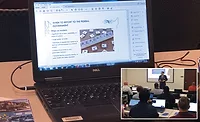Cybersecurity Talent Pipeline Not Being Fed by High Schools
While U.S. government officials find the current pipeline for cybersecurity talent to be lacking, 82 percent of U.S. millennials say no high school teacher or guidance counselor ever mentioned to them the idea of a career in cybersecurity, according to a new survey commissioned by Raytheon and conducted by Zogby Analytics. The survey also found less than one-quarter of young adults aged 18 to 26 believed the career is interesting at all.
"Given that we need to add thousands of cybersecurity professionals to the workforce in the coming years, the data shows we have a long way to go in engaging young people in the idea of a career path in cybersecurity," said Michael Kaiser, executive director of the National Cyber Security Alliance. "We have to work together to ensure that young people are prepared to use technology safely, securely, ethically and productively and are aware of the interesting and rewarding jobs available protecting the Internet."
Young men (35 percent) are far more interested than young women (14 percent) in a career in cybersecurity, according to the survey, which was released as the U.S. marks the 10th anniversary of National Cyber Security Awareness Month, sponsored by the Department of Homeland Security and the National Cyber Security Alliance.
The survey found many young adults raised on social networking trust technology and are not overly concerned about the threat of online identity theft or of their personal data being stolen. Seventy-five percent of survey respondents said they were confident their friends would only post information about them on the Internet that they are comfortable with and 26 percent said they had never changed their mobile banking password.
The Facebook Generation, sometimes referred to as "Generation F," includes millennials who have grown up using social networking tools such as Twitter, Facebook, LinkedIn and Pinterest. The Raytheon Millennial Cybersecurity Survey found that despite their risky online behavior, many millennials are becoming aware of Internet risks and are taking steps to protect themselves. Eighty-two percent of millennials password-protect their laptop or desktop computer, the survey found, while 61 percent password-protect their mobile phone. Thirty-seven percent of millennials said they had backed up the data on their laptop or desktop in the last month.
"Today's millennials are tomorrow's leaders and their embrace of technology will continue to drive our economy forward," said Jack Harrington, vice president of Cybersecurity and Special Missions for Raytheon's Intelligence, Information and Services business. "This survey shows the gaps that exist in teaching personal online security to our youth and in our efforts to inspire the next generation of innovators."
For more detail and analysis of the survey findings, please visit the Raytheon Millennial Cybersecurity Survey Report and infographic illustrating the survey findings.
Looking for a reprint of this article?
From high-res PDFs to custom plaques, order your copy today!






